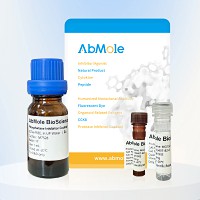All AbMole products are for research use only, cannot be used for human consumption.

DSPE-PEG-Streptavidin is an important biocoupling molecule widely used in biomedical research, especially in drug delivery, targeted therapies, immunodiagnostics and biosensors. Through the specific binding between streptavidin and biotin, DSPE-PEG-Streptavidin can help to achieve efficient loading and targeted action in targeted delivery systems. In addition, the molecule is widely used in molecular imaging and bioassays, especially for molecular recognition using the strong affinity between streptavidin and biotin in assay platforms that require high sensitivity and specificity.
DSPE-PEG-Streptavidin has the following properties:
WATER SOLUBILITY: Due to the presence of PEG, DSPE-PEG-Streptavidin has good water solubility and can be stabilised in organisms or in aqueous solutions.
Biocompatibility: PEG has good biocompatibility, which can reduce the immunogenicity of the compound and reduce the toxicity to the organism. Also, Streptavidin has good biocompatibility.
Specific binding: Streptavidin has a high affinity and specific binding ability to bind biotin to form stable complexes.
Chemical modifiability: DSPE-PEG-Streptavidin has a certain degree of hydrophobicity and can form micellar structures or stabilising droplets at the interface. Meanwhile, the hydroxyl group at the end of the PEG chain can be subjected to a variety of chemical modifications to further extend its application.
DSPE-PEG-Streptavidin exhibits multiple uses in bioscience research and applications:
Biosensors: As a key component of biosensors, DSPE-PEG-Streptavidin achieves specific biomolecule recognition and binding ability by modifying on the sensor surface.
Drug Delivery: As a carrier of drug delivery system, DSPE-PEG-Streptavidin can achieve targeted delivery of drugs through its specific binding ability, improving the therapeutic efficacy of drugs and reducing side effects.
Tissue engineering: In the process of constructing artificial tissues and organs, DSPE-PEG-Streptavidin can promote targeted cell growth and tissue regeneration by modifying on the surface of scaffold materials.
Bio-imaging: By modifying on the surface of nanoparticles, DSPE-PEG-Streptavidin can improve the stability and biocompatibility of imaging agents, enabling high-resolution imaging of specific tissues or cells.
Laboratory research: DSPE-PEG-Streptavidin also has a wide range of applications in laboratory research, such as immunoprecipitation, protein purification and protein interaction studies.
| Solubility (25°C) | Water |
| Storage | 4°C, protect from light, dry, sealed |
| Related Products |
|---|
| 3-Phenylthiophene
3-Phenylthiophene is a biochemical material that can be used in scientific research. 3-Phenylthiophene is a conducting polymer precursor. |
| DSPE-PEG-FA
DSPE-PEG2K-FA is a PEG derivative containing folic acid. DSPE-PEG2K-FA has a targeting effect and can bind to folic acid receptors in cancer cells. DSPE-PEG2K-FA forms micelles/lipid bilayers and can be used in research on targeted drug delivery systems. |
| Lifastuzumab
Lifastuzumab is a humanized anti-NaPi2b IgG1 monoclonal antibody. |
| GPVI antagonist 1
GPVI antagonist 1 is a glycoprotein VI (GPVI) platelet receptor antagonist. GPVI antagonist 1 inhibits collagen-induced platelet aggregation with an IC50 of 25.3 μM. |
| MPSD TFA
MPSD TFA (MARCKS-ED TFA) is a 25-amino acid peptide based on the effector domain sequence of the intracellular membrane protein myristoylated alanine-rich C-kinase substrate (MARCKS). MPSD TFA can sense membrane curvature and recognize phosphatidylserine. MPSD TFA can be utilized as biological probe to study membrane shape and lipid composition. |
All AbMole products are for research use only, cannot be used for human consumption or veterinary use. We do not provide products or services to individuals. Please comply with the intended use and do not use AbMole products for any other purpose.


Products are for research use only. Not for human use. We do not sell to patients.
© Copyright 2010-2024 AbMole BioScience. All Rights Reserved.
